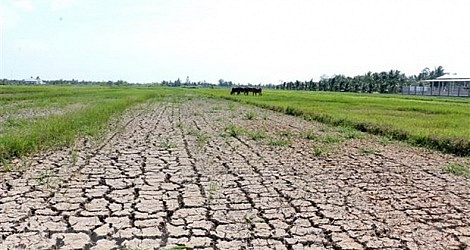Mekong Delta Resilient Business Network officially debuts
 |
| VCCI Can Tho and The Asia Foundation have organised the official debut ceremony for the Mekong Delta Resilient Business Network |
The network is in charge of updating information and techniques in the field, bolstering firms’ operations and their role in policymaking and social responsibility.
Established last July, the network, under the sponsorship of the UPS Group, is the first for firms to seek measures to improve business capacity and contribute to policy building in the backdrop of climate change. It combines 39 members, 24 of which are businesses.
Director of VCCI Can Tho Nguyen Phuong Lam said, “The non-profit MRBN will mobilise the business community to study and evaluate the impact of climate change on firms in the Mekong Delta and act as the representative for enterprises to hint at changes in policy.”
The Mekong Delta, known for its fertility and rice fields, has been facing enormous challenges posed by climate change and upstream activities, according to environmental officials.
According to the Department of Water Resources Management under the Ministry of Natural Resources and Environment, saline intrusion in this dry season would affect 210,000 hectares of rice, orchards, and rice-shrimp fields in the region. At its peak, saltwater intrusion will likely affect 60,000ha of rice fields in the coastal provinces, including 11,900ha in Tien Giang, 12,000ha in Ben Tre, 15,000ha in Tra Vinh, and 20,000ha in Soc Trang.
Meanwhile, 43,300ha of fruit growing areas would be affected, including 3,100ha in Long An, 21,800ha in Tien Giang, 16,000ha in Ben Tre, and 3,400ha in Soc Trang. Around 107,400ha of integrated rice-shrimp fields would be hit in Kien Giang, Ca Mau, Soc Trang, and Bac Lieu. By 2050, it is estimated that agricultural output may decline by 30 per cent, equalling damages of over $520 million due to desalination.
What the stars mean:
★ Poor ★ ★ Promising ★★★ Good ★★★★ Very good ★★★★★ Exceptional
Related Contents
Latest News
More News
- Bac Ai Pumped Storage Hydropower Plant to enter peak construction phase (January 27, 2026 | 08:00)
- ASEAN could scale up sustainable aviation fuel by 2050 (January 24, 2026 | 10:19)
- 64,000 hectares of sea allocated for offshore wind surveys (January 22, 2026 | 20:23)
- EVN secures financing for Quang Trach II LNG power plant (January 17, 2026 | 15:55)
- PC1 teams up with DENZAI on regional wind projects (January 16, 2026 | 21:18)
- Innovation and ESG practices drive green transition in the digital era (January 16, 2026 | 16:51)
- Bac Ai hydropower works stay on track despite holiday period (January 16, 2026 | 16:19)
- Fugro extends MoU with PTSC G&S to support offshore wind growth (January 14, 2026 | 15:59)
- Pacifico Energy starts commercial operations at Sunpro Wind Farm in Mekong Delta (January 12, 2026 | 14:01)
- Honda launches electric two-wheeler, expands charging infrastructure (January 12, 2026 | 14:00)

 Tag:
Tag:


























 Mobile Version
Mobile Version